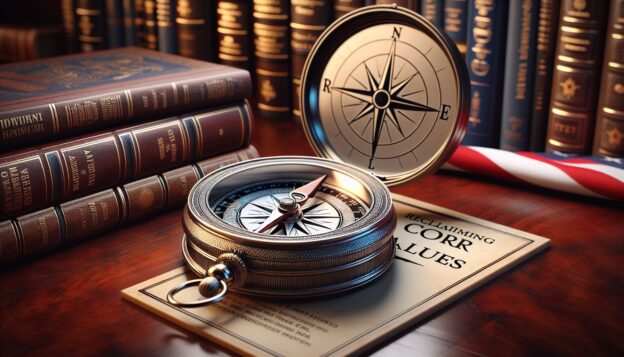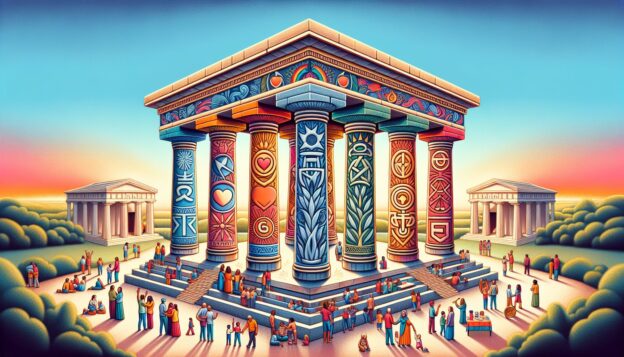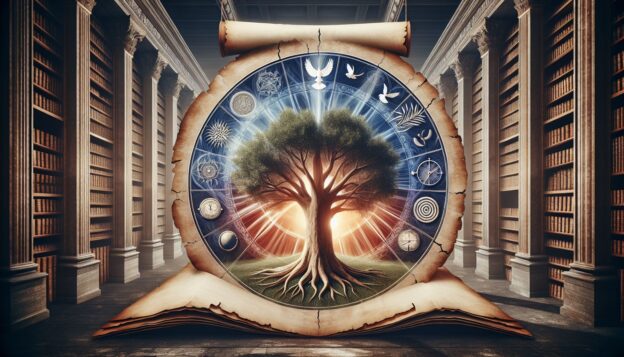As the fabric of American society undergoes a seemingly relentless tug-of-war, the essence of our national identity—embodied by the enduring principles of conservatism—stands as a beacon of reason, morality, and individual liberty. At the heart of these principles lies the unwavering belief in the sanctity of the family unit, the intrinsic value of free enterprise, and the indomitable spirit of American exceptionalism that has, since our Republic’s dawn, been a shining example to the world.
In this crucial moment of cultural shift, where progressive ideals often undermine these foundational concepts, we must remember the stories of the leaders and thinkers who have walked before us. Men like Ronald Reagan and William F. Buckley Jr., who not only personified the conservative ethos but also fought vigorously to preserve it. Their legacy implores us to challenge the advancing wave of progressivism that threatens to erode the core values that have made America a symbol of hope and opportunity.
The recent political landscape has been marred by a narrative that suggests a break from traditional values. Progressives, armed with an arsenal of catchphrases like “social justice” and “equity,” have presented a version of America that seems almost unrecognizable to those who grew up cherishing the stories of our Founding Fathers. However, it is important not to misconstrue the intentions behind these buzzwords. While they are presented under the guise of compassion and fairness, the reality often results in overregulation, diminished personal freedom, and a move toward a more socialistic state.
True conservatism acknowledges the complexity of governance, yet it fundamentally understands that a society’s strength emanates from the independence and virtuousness of its citizens. It venerates the rule of law, national sovereignty, and the time-tested significance of faith and family. On these principles, we can build a society that flourishes economically, socially, and spiritually.
Take, for example, the concept of economic freedom—the cornerstone of the American Dream. The free market, when unshackled from excessive regulatory burdens, encourages innovation, rewards hard work, and provides a level playing field for all. This is not merely an ideological stance but is supported by ample evidence. According to the Heritage Foundation’s Index of Economic Freedom, there is a direct correlation between economic freedom and prosperity. Nations with freer economies enjoy higher GDPs per capita, better health, and educational outcomes, and importantly, greater societal wellbeing.
Yet, today’s political discourse suggests that the market cannot be trusted, painting a bleak portrait of capitalism as a system of oppression rather than opportunity. This, my friends, is a dangerous fallacy. By highlighting instances of failure and dismissing an abundance of success, progressive politicos put forth policies that stifle entrepreneurship and ambition. We must acknowledge the risks and abuses that exist but vigorously defend capitalism’s overarching benefits if we want to ensure a prosperous future for the next generation.
On another front, the assault on the nuclear family structure poses a fundamental threat to society’s stability and the well-being of our children. Decades of research solidify the family as the prime nurturer of virtues, with intact families typically yielding better outcomes in education, emotional health, and future financial stability. Yet modern narratives push the notion that traditional family models are archaic, even oppressive. This perilous stance not only undermines the irreplaceable role families play in community building but also erodes the societal fabric that binds us together.
Responsible conservatism must also actively advocate for a coherent immigration policy that secures our borders while upholding the honorable legacy of being a welcoming haven for the oppressed. We are a country founded and built by immigrants who embraced American values. Any immigration policy must respect the rule of law but also remember the human element behind the issue—striving for a balance that preserves both our national security and our national soul.
Equally important is the defense of religious liberty. Faith, for many Americans, is not a mere weekend observance but a way of life that permeates every decision they make. Sadly, the present climate has witnessed individuals and businesses come under attack for living out their convictions. We must remain vigilant in protecting the freedom to worship, or even to not worship, as an essential element of a free society.
As we gaze upon the landscape before us, bursting with the potential for innovation, generosity, and genuine progress, we must tether our pursuit of the future to the wisdom of the past. We should consider the vision of President Reagan, who endeavored to foster an America where freedom thrived within the bounds of a moral order. In doing so, our path forward becomes clear: the promotion and preservation of life, liberty, and the pursuit of happiness, not through dependency on government, but through empowerment of the individual.
We are at a crossroads where the virtues of our forebears can be our roadmap, and where conservatism is not a list of grievances, nor an ideology of no, but a principled, positive, and passionate declaration of the enduring truths that have, and will continue to, make America great.
In conclusion, the battle for our nation’s heart and soul rages on. It is incumbent upon us, the torchbearers of conservative thought, to articulate our message with conviction, and inspire with the promise of America’s greatness. Let us stand firm in defense of the principles that foster true liberty, prosperity, and the well-being of all citizens. In the tumultuous political sea, conservatism, with its deep moorings in our national heritage, is not only our best defense but our brightest hope.









